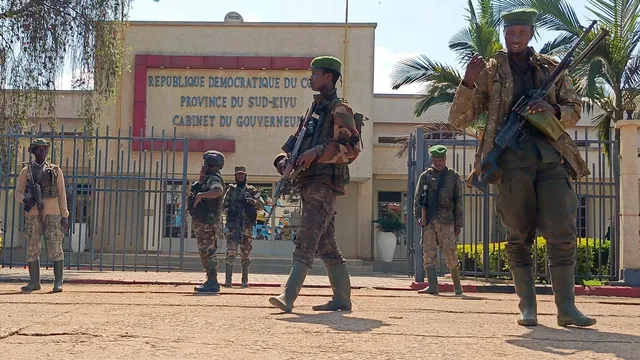
Rwanda-backed rebels seize major cities in Congo amid escalating conflict
2025-02-20 00:00- The M23 rebel group has captured Goma and Bukavu, significant cities in eastern Congo.
- With international calls for ceasefire and dialogue, no effective measures against Rwandan involvement have been undertaken.
- The ongoing escalation threatens not only regional stability but also the control over Congo's vital mineral wealth.
Express your sentiment!
Insights
In January 2025, Rwanda-backed M23 rebels captured Goma, a major city in the eastern Democratic Republic of Congo (DRC). The rebels have since marched southward, seizing Bukavu this past weekend. Their advance has raised concerns about a potential regional conflict as they appear to threaten stability in a mineral-rich area critical for global supply chains. The M23 group, comprised mainly of ethnic Tutsis who previously failed to integrate into the Congolese army, claims to be safeguarding their community from discrimination while critics allege that their actions are driven by a desire for economic and political control in the region. This marked escalation of violence has been facilitated by support from the Rwandan military, with reports indicating substantial troop and weaponry backing. International responses have been cautious, largely focusing on calls for dialogue and a ceasefire without implementing strict financial or diplomatic pressures on Rwanda, which has historically played a complex role in Congo's conflicts. Observers suggest that this muted action may stem from guilt over past failures to intervene in crises in Rwanda, particularly the 1994 genocide, and Rwanda's increasing geopolitical influence. The urgency for resolution has escalated, with regional leaders participating in summits urging for a ceasefire. However, the M23 rebels have indicated refusal to withdraw unless conditions are met, such as halting the Congolese military's operations. This ongoing conflict raises alarms of reminiscent broader regional warfare, drawing in complex historical social dynamics and extended regional alliances, given the DRC's rich natural resources that have often fueled prolonged conflicts.
Contexts
Ethnic tensions in eastern Congo have been a persistent and complex issue, deeply rooted in the historical, social, and economic fabric of the region. The Democratic Republic of the Congo (DRC) has experienced decades of conflict, fueled by ethnic rivalries, resource competition, and the legacies of colonial rule. Eastern Congo, particularly the Kivu provinces, has been significantly affected by the presence of numerous armed groups, many of which are ethnically aligned. These tensions have often resulted in violence, displacement, and human rights abuses against civilian populations. Moreover, the struggle for control over mineral-rich areas has exacerbated existing divisions, creating a cycle of conflict that is difficult to break. In recent years, the situation has become increasingly dire, with reports of inter-communal violence and retaliatory attacks between various ethnic groups. The Mai-Mai militia, the Democratic Forces for the Liberation of Congo (FDLC), and other armed groups have engaged in violent confrontations against each other, as well as against government forces. This violence is often justified by claims of defense against perceived threats from rival ethnic groups. The DRC government has struggled to contain this violence, facing challenges both from within the military and from external influences, including neighboring countries that have vested interests in the region's resources. International organizations, including the United Nations, have called for comprehensive strategies to address the root causes of ethnic tensions in eastern Congo. Initiatives aimed at fostering dialogue among communities have been implemented, though results have been mixed. The complex interplay of local grievances, identity politics, and regional dynamics poses significant challenges for peacebuilding efforts. Humanitarian organizations have reported alarming levels of displacement, with millions of people forced to flee their homes due to violence. The long-term consequences of this instability are profound, as families are often separated, livelihoods are destroyed, and educational opportunities are disrupted. Addressing the ethnic tensions in eastern Congo requires a concerted effort from both national and international actors. It is essential to promote inclusive governance, equitable resource distribution, and community reconciliation. Ensuring that marginalized voices are heard and integrated into peace processes is crucial for sustainable solutions. Strengthening the capacity of local institutions and empowering communities can help mitigate tensions and foster a sense of ownership over peacebuilding initiatives. While the path forward is fraught with uncertainty, a holistic approach that addresses socioeconomic disparities and promotes ethnic harmony is vital for lasting peace in the region.